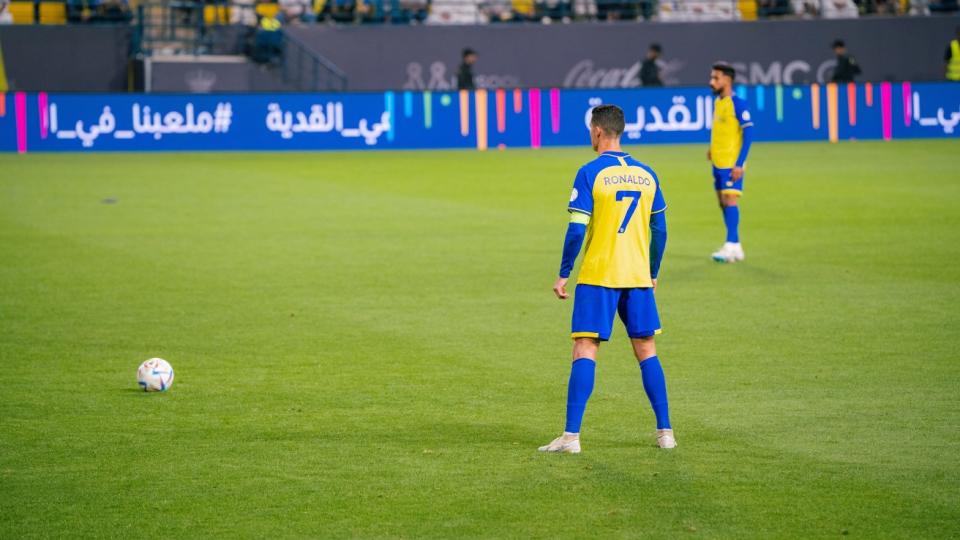“A real cause of transformation” – The CEO of Al-Nassr praises Saudi Arabia’s football project

Interview with the CEO of Al-Nassr FC
Saudi football is on the move. In January 2023, Cristiano Ronaldo, the world’s most followed individual on Instagram, joined the Saudi Pro League’s (SPL) Al-Nassr. Last June, the country’s sovereign wealth fund (PIF) took majority stakes in the club and the other SPL “Big Four”, followed by a raft of international signings. Last week it was announced that up-and-coming Brazilian winger Angelo Gabriel will be joining Al-Nassr from Chelsea.
To learn more about the impact of this and the outlook for Saudi football, Sir Martyn Lewis interviewed Guido Fienga, CEO of Al-Nassr, for Inside Saudi. Mr Fienga started his career as a media and telecoms financier before joining Italy’s AS Roma, where he rose to become CEO. He joined Al-Nassr in September 2023.
Sir Martyn Lewis (ML) – You have had a remarkably successful career in the worlds of football and finance. What made you decide to accept the offer to run a top Saudi club?
Guido Fienga (GF) – I was delighted to embrace this project when I understood that football is a kind of start-up inside the start-up of the country. Football is one of the most effective enablers of the infrastructure investment they are doing in Saudi and a real cause of social and cultural transformation. What I had in mind was to participate in this transformation through one of the most powerful platforms in the world, and that is football.
ML – How has PIF’s involvement made a difference to the Saudi football scene?
GF – Football existed in Saudi before this transformation – it is a super passionate football country, like Italy. Before, Saudi football was a more domestic product, consumed by Saudis. Today, the SPL is a global product.
PIF has given a tremendous boost. It’s not involved in any strictly football-related decisions, but is heavily focused on developing governance and institutions, and encouraging the development of talent – not just players, but also professional management talent.
ML – Chinese clubs have unsuccessfully spent large sums to boost their performance. What makes you think it is going to work with Saudi?
GF – I have a lot of respect for the Chinese project, but it started in a different way and in a different environment. First of all, the population was not as interested in football as in Saudi. Secondly, football in Saudi is a real national project. In China, this was more mandated to private firms and there was no direct involvement of public institutions. I am positive that we will be able to build a strong football ecosystem.
ML – What has been the impact of Cristiano Ronaldo?
Within the club, team, and locker room, he has elevated the standard of training and welfare of athletes, which has spread to the wider league. I have never seen anyone as professional, disciplined or detailed as him, and his commitment goes beyond the pitch.
Cristiano Ronaldo as a first mover has given this project credibility. Thanks to Ronaldo and the support of all the people and institutions we have on board, Al-Nassr is probably the most powerful platform with global engagement from Saudi.
ML – How has women’s football and domestic talent been taking off?
GF – Youth development is at the core of our project. Saudi will host the World Cup in 2034, and the under-21s today will be components of the national team. But it is not just about players. My role is to drive growth of the wider organisation and ecosystem.
I’m proud that Al-Nassr won the first two Saudi Women’s Premier League seasons. Women’s football is a serious project, and its development will break preconceptions. In some environments in Saudi, women are more commonly engaged in leadership positions than in Western countries. One of our board members is a lady, and I don’t know how many top clubs globally have a woman on their board.
ML – In 2022, the global professional football union listed Saudi as a country to avoid because of systemic contract and salary violations. How are perceptions of Saudi football changing and what do you see as the challenges ahead?
GF – That situation has been resolved. Football must be an example of credibility and I’m personally involved in developing standards. Everything is professionalised and the guarantee is the presence of reputed institutions like PIF.
The vast majority of those who came after Ronaldo are happy. Not just because they happen to be receiving two or three times what they were receiving in Europe, but because they feel they are developing something new. I was a speaker at the World Football Summit Asia in Jeddah in December. There was tremendous curiosity about what’s going on, if this is just short-term or a bubble. The summit was very helpful in showing that we are here to develop a real industry with a long-term perspective.
ML – Do you think the Saudi Pro League will take on the Premier League?
GF – Although the target of the SPL in the next ten years is to be, probably together with the Premier League, the most widely followed championship in the Middle East, Asia, and Africa – if not also globally – we don’t consider ourselves a competitor. They are two different products and there is room for both.